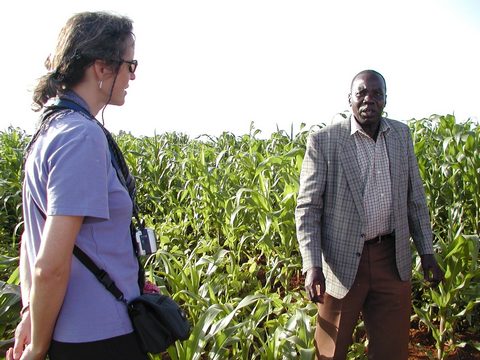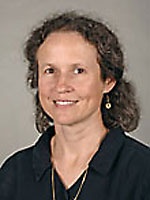Restless Rebecca
I’m a mother and a wife. The idea of so many mothers not being able to feed their families, and so many children not getting the nutrients they need to reach their potential, has always pained me.” – Rebecca Nelson (pictured), Professor, Plant Pathology and Plant-Microbe Biology, Cornell University, USA
In this dispatch from the ‘frontline’, fired up and leading the charge against crop disease is ‘frontier’ scientist, restless Rebecca Nelson. Where does Rebecca’s restlessness and consequent fire come from? She says it has always bothered her that a billion people go hungry every single day…
Wrestling Rebecca: feeding families one disease-resistant crop at a time
Wanting to remedy this billion-strong calamity, Rebecca has spent the last quarter century working with national and international institutes in Asia, Africa and the Americas. During this time, she has focused on understanding the ways in which plants defend themselves against diseases.
“An amazing percentage of crops are lost to pests and diseases in the developing world each year, which in turn leads to lack of food and impoverishes local economies,” she says. “These farmers can’t afford the herbicides and pesticides that developed-world farmers use to protect their crops, and those are not great solutions to the problems anyway. So it’s important to find ways to help these crops defend themselves.”
This means identifying crops with disease-resistant traits and using them to breed disease-resistant crops with long-lasting protection from a multitude of diseases.
We were really grateful that the GCP funded us so we could continue to understand and build resistance to rice blast and bacterial blight, and to connect the work on rice and maize”
Travels and travails to make a difference
After completing a PhD in zoology at the University of Washington, USA, in 1988, Rebecca spent eight years in The Philippines at the International Rice Research Institute (IRRI) and then five years at the International Potato Center in Peru. “I wanted to get out into the world and try and have a practical impact instead of doing research for the sake of research,” she says.
During her time in The Philippines, Rebecca worked on several rice disease-resistance projects. She was to continue many of these projects nine years later, as part of her GCP project – Targeted discovery of superior disease QTL alleles in the maize and rice. “We were really grateful that GCP funded us so we could continue to understand and build resistance to rice blast and bacterial blight, and to connect the work on rice and maize,” she says.
Rebecca was also delighted to involve her IRRI mentor, Hei Leung (then a GCP Subprogramme Leader for genomics), and friend, Masdiar Bustamam, of the Indonesian Center for Agricultural Biotechnology and Genetic Resources Research and Development (ICABIOGRAD). During her time at IRRI, Rebecca and her IRRI team had worked with Masdiar to establish her laboratory. “It was really pleasing to have Masdiar participate in the project and to see how far she and her lab had come since our earlier collaboration. The difference is that they now made a markedly significant contribution to the project in advancing the understanding of inheritance of rice blast and sheath blast resistance, and they developed germplasm that has really good resistance to these diseases.”
I’ve always been grateful to GCP for supporting me at that transitional stage in my career…. [I] was a relative newbie when it came to working with maize. However, I was lucky to have some really great collaborators…James helped me a lot at the start of the project and throughout. Even though our project is finished, we have teamed up on a number of other projects to continue what we started.“
Tentative transition from rice to maize; shunting between class and grant-giving
Despite winning a merit-based competitive grant, Rebecca confesses she wasn’t sure GCP would accept her proposal, owing to her then limited experience in maize research. “I’ve always been grateful to GCP for supporting me at that transitional stage in my career. I’d just returned from Peru and taken up a position at Cornell and was at that time a relative newbie when it came to working with maize. However, I was lucky to have some really great collaborators.”

Rebecca (left) on a field visit to Kenya in September 2006. On the left is John Okalembo of Moi University, with James Gethi behind the camera.
One such collaborator, who Rebecca is thankful to have had on her project, was James Gethi, of the Kenya Agricultural Research Institute (KARI), and a leading researcher in Kenya. At the time, James was a recent Cornell graduate who was returning home to help bolster his nation’s crop-research capabilities. “James helped me a lot at the start of the project and throughout. Even though our project is finished, we have teamed up on a number of other projects to continue what we started.”
At Cornell, Rebecca oversees her own laboratory and still finds time to teach a class on international agriculture and rural development. She also serves as scientific director for the McKnight Foundation’s Collaborative Crop Research Program (CCRP), a grants programme funding agricultural research in developing countries.
Growing up with science…and a moderate Rebecca rebellion!
As our conversation draws to a close, Rebecca reveals she is currently skyping from the bedroom she grew up in, in Bethesda, Maryland, half an hour from downtown Washington DC, USA. “I’m down visiting my parents before I jet off to West Africa tomorrow,” she says where she is carrying out her CCRP commitments.
Rebecca credits her parents for encouraging her scientific inquisitiveness and determination to aid those in need. “Both of my parents are physicians, as is my younger brother. I thought I was a rebel with my interest in agriculture, but my younger sister is a farmer and agroecologist, so I guess we’re both straddling agriculture and science,” Rebecca says with a laugh.
“In all honesty though, my parents encouraged all of us to follow what we were fascinated by and passionate about, and for me and my sister, that was agriculture. We reared goats in our suburban backyard, dissected animal road-kills on the kitchen table and even turned the family swimming pool into a fish-pond because we wanted to learn about fish farming!” Rebecca recollects with great fondness.
I still get a kick out of trying to understand the biology of disease resistance and to try to help develop disease-resistant crops, which will help alleviate the fallout from crop failure and subsequent food shortages in developing nations”
Wife and mum, manager and mentor, and what gives Rebecca a kick
Rebecca says she and her journalist husband, Jonathan Miller, try to encourage their two sons, William and Benjamin, in the same manner. She also says she uses a similar theory as a mentor. “I love interacting with the young talent and I like to think I’ve grown as a person the more that I’ve evolved as a manager and mentor.”
Although she spends most of her time at her desk or on a plane or in a meeting room, Rebecca is always keen to jump back into the field and familiarise herself with the science she is overseeing. “I still get a kick out of trying to understand the biology of disease resistance and to try to help develop disease-resistant crops, which will help alleviate the fallout from crop failure and subsequent food shortages in developing nations.”
Links
- Rebecca’s project, Targeted discovery of superior disease QTL alleles in the maize and rice genomes
- Rebecca at Cornell University
- Our current work on maize and rice
- Crop genomics at GCP
- GCP capacity building








